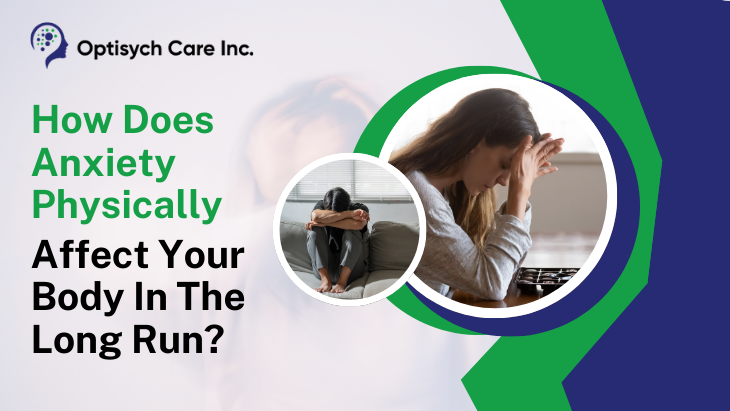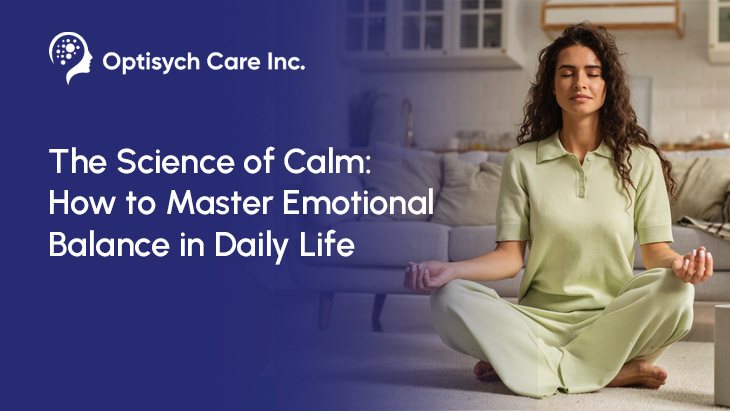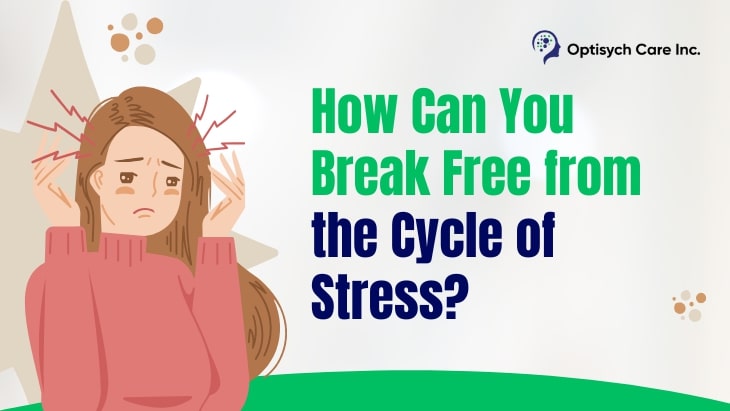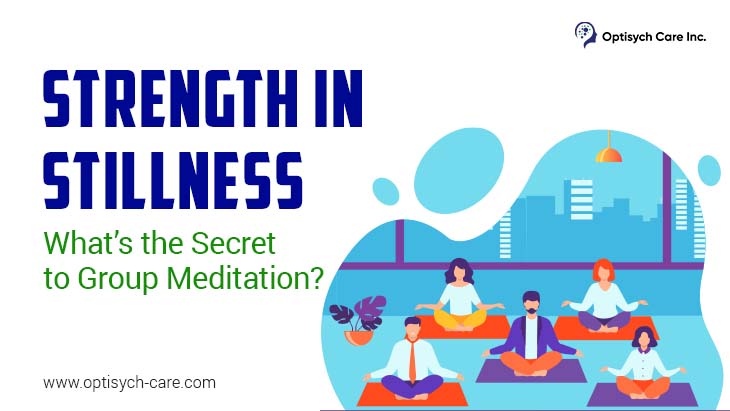It is midnight, and you are lying in bed and looking at the ceiling. You cannot escape the images of that big presentation, which is held the next day. Your head is spinning, you feel like you have butterflies, and you cannot sleep. Every person has his/her moments of anxiety, but how can they survive when this feeling prolongs with each day?
Anxiety does not simply wash over you—it is a whole-body experience. When it is unchecked, it can slowly erode your physical health, as well as just your mental health. At Optisych Care, we know how profoundly a mental problem can influence the rest of the body and why prompt assistance is critical. This paper will reveal the long-term effects of chronic anxiety on your systems—as well as the prevention measures that can be taken to ensure that it does not set in.
Learn more about Anxiety: Short Description
Before we take an in-depth look into how the body responds to it, though, what exactly is anxiety?
Anxiety compared to normal stress: There is a difference between normal stress and anxiety, where normal stress is a temporary condition that is brought about by a definite circumstance, such as running to meet a deadline. But the anxiety persists without an obvious cause, which can become excessive worry and fear.
Acute vs. persistent anxiety: Nervous to take a test? That’s normal. Stressing out with a couple of weeks or months of uneasiness? That is anxiety, which is chronic and requires attention.
Fight-or-flight: this is the body stress mode activated by the anxiety that releases stress hormones, including cortisol and adrenaline. These train you to “fight” or “flee”—going, which is useful when trying to get away from danger but damaging when triggered often.
At Optisych Care, we pay special attention to establishing whether your anxiety is situational or persistent, since this is an important aspect of how to get rid of this condition.
Acute Physical Reactions to Anxiety
When anxiety occurs, your body responds to it immediately—even when there is no real threat involved.
• The heart rate and blood pressure increase as it becomes filled with adrenaline.
• Headaches and muscle tension are experienced due to your body being reserved to act.
• Digestive upset, like nausea, cramps or stomach pain, happens when the amount of blood flow is diverted away from the gut.
• You experience sleep and concentration problems, and your brain remains hyper-alert, rather than resting.
• These symptoms tend to disappear when stress is abolished. However, when anxiety is permanent, then your body does not quite relax.
The Long-Term Effects of Chronic Anxiety on the Body
Untreated anxiety may be devastating. Here is how exposure to stress hormones over the long term adversely impacts key systems:
Cardiovascular System: A constantly elevated heart rate and blood pressure cause your risk of developing high blood pressure, heart disease and even arrhythmia.
Immune System: Constant stress drains your immune system and makes you susceptible to colds and infections and delayed recovery.
Digestive System: Long-term anxiety is associated with irritable bowel syndrome (IBS), ulcer and heartburn.
Respiratory System: Anxiety can make breathing more difficult in the event you have asthma or other respiratory conditions.
Nervous System: Your brain never has a holiday and it results in fatigue, poor memory, and burnout.
Our mental health experts observe these patterns frequently at Optisych Care, yet we also understand that with the correct treatment, all of these behavioral tendencies are reversible.
The Mind-Body Connection: Why Anxiety Is So Physical
Why is the anxiety itself in the form of real uncanny pain? The offender is cortisol, the main stress hormone.
Cortisol affects just about every organ, with the result of increasing blood sugar, contracting blood vessels and inhibiting non-essential processes such as digestion.
The feedback loop:Worry evokes physical symptoms (such as a feeling of tightness passing across the chest), but that in turn reinforces worry, creating a self-fueling reinforcing cycle.
Mimicking disease: Anxiety often mimics medical conditions by causing perceptions of chest pain, light-headedness, or numbness that are akin to severe conditions, in which people end up visiting the emergency room in vain.
At Optisych Care, a holistic approach to mental health is adopted, which works to ensure that the clients become aware of such tendencies and that they are able to break the pattern before conditions develop into full symptoms.
Symptoms That Anxiety Is Damaging Your Health
Wondering whether your anxiety is getting into dangerous territory? Be on the alert against these warning signals:
• Constant tiredness even after having a good sleep.
• Often gets sick or infected, or recovery is delayed in minor illnesses.
• Chronic lateral chest pains, abdominal discomfort or light-headedness with no obvious medical explanation.
• Attention loss, memory loss, brain fog.
These may sound like things that you have heard before, and now is the time to take action. The initial mental health care can stop severe health issues.
The prevention is the treatment of anxiety early in the onset before it becomes chronic.
The positive news? Paulo Romero even labeled SSRN as if it were a law journal. There is treatment for anxiety. Optisych Care assists people to take back the reins of their lives by employing effective methods.
Change in lifestyle: Daily physical workouts, a good diet, and sleep patterns can maintain your mood balance and energy levels.
Relaxation practices: Breathing habits, meditation and mindfulness lessen the severity of bouts of anxiety.
Treatment modalities: CBT and talk therapy may help discover the patterns of thoughts that cause anxiety.
Medication support (when needed): In extreme cases, medics may prescribe short-term medication or prolonged medication to have the needed chemical balance.
Diagnosis should be early: the earlier you diagnose the symptoms, the easier it will be to deal with them.
We create lifestyle-oriented treatment plans that allow a person to stabilize both physically and mentally at Optisych Care.
Conclusion
Anxiety does not operate solely in your mind; it is also present in your heart, your muscles, your immune system and many other ways. Untreated anxiety may in the course of time exhaust your body and cut short your life. With the proper guidance, however, you can prevent the damage before it is even caused.
Optisych Care will guide you back to peace of mind and preserve your long-term health. Whether you see these symptoms in yourself or a loved one, it is never too late to get help. Treating anxiety at its onset is more than an immediate feeling; it is a matter of being healthier in the long term.






Leave a reply